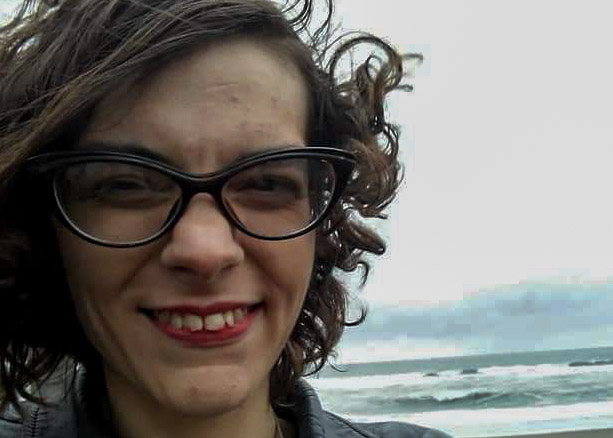
Alexandria Tereshka in an undated photo provided by her family.
Massah Morris leaned into the turn coming off the Marion Street Bridge and onto Highway 22 when something dark in the road loomed ahead.
With no time to react, he ran over the object with his SUV at about 55 miles per hour. The car behind him, driven by Lori Goree, did the same.
Goree instantly thought she’d hit a person, she would later tell the Salem Police Department. When she and other drivers braked and stepped into the night, she heard a confirming shout.
Sometime that Saturday night in November, 27-year-old Alexandria Tereshka, clutching a folder of court records and contact information for doctors, lay down in a lane of the busy state highway.
The incident last fall got a flurry of attention following a three-sentence press release from Salem police that said she had lain in the middle of the road and no charges would be filed. The matter soon fell from public attention.
Police concluded Tereshka’s death was a suicide, putting her among more than 800 Oregonians who died by suicide last year. Her death stood out from many because it was so public but so little was known what happened.
Suicides have risen in recent years in Oregon, as have calls for funding treatment for substance abuse and mental health disorders.
Oregon is enduring a mental health crisis, with a shortage of treatment and a booming caseload. Oregon State Hospital is so jammed it can’t take people judges are designating for treatment. Addiction treatment, meanwhile, is available through private clinics, but slots in public institutions are scarce.
Last year, 54,551 people in Oregon received publicly funded addiction treatment, according to the Oregon Health Authority.
Tereshka’s death embodies the frustrations of those needing care and the challenges of professionals across Oregon who try to help.
Salem Reporter traced her life, obtaining more than 700 pages of government medical records, released with her family’s consent. That was supplemented by interviews, court records and police reports pieced together over several months.
A portrait emerged of a woman beset by major depression and unshakable addiction to methamphetamine, of a patient in and out of a public system that at times didn’t have services open that she needed.
She wanted badly to shake her demons. Her pursuit to that end led her to the right lane of Oregon’s Highway 22.

An evidence marker off Oregon Highway 22 on Nov. 3, 2018. (Salem Police Department photo)
Like mother, like daughter
Relatives braced for Tereshka’s arrival at the Clinton Street Theater in Portland. It was her mother’s funeral.
Then 24, Tereshka was high, wearing short-shorts, fishnet stockings, tall boots and an eyepatch.
Her family, seeing the outfit and hearing the heavy-booted entrance on that October day in 2015, expected pyrotechnics.
“She wanted to make sure everyone knew she was like ‘Fuck you’ to the convention of a funeral,” said Jeanne deParrie-Turner, an aunt.
Their expectation was rooted in years living with Tereshka’s rebellious showmanship.
Born in Portland to Djinn and David Tereshka in 1991, Tereshka showed intelligence and creativity from an early age, her relatives recalled. She wrote. She played music and gravitated to 70s punk and rock n’ roll.
In high school, she shaved her eyebrows and replaced them with scrolling designs she painted on in the morning. She thought it was funny to shave her head, too, and cape herself in a communist flag.
“She was a very spirited person, just like Djinn was. Extremely, extremely intelligent, just like Djinn was,” said Michelle deParrie, another aunt. “Precocious. Temperamental.”
As a kid, Tereshka challenged others in debate, especially those who tried to tell her what to do. She clashed with family members who were fundamental Christians – but she could pick a fight over anything.
“She would argue with people about stuff she had no opinion on,” said her brother, Jerod Tereshka.

Djinn Tereshka holds daughter Alexandria next to sisters Michelle deParrie, left, and Nicole deParrie in this undated photo. (Courtesy of Jeanne deParrie)
Their dad was a drug addict, in and out of his children’s lives until his death before they were teenagers. Their mother grappled with schizophrenia and her own substance addictions. She struggled to provide a stable home, but disappeared for days. She talked of hearing voices. When they were teens, she worked as an escort.
Tereshka drifted in and out of her mother’s life. She was 18 when Portland police arrested her for attempted prostitution. To the judge handling her case, she said living with her mother again would keep her off the streets — that she would make her mom a promise.
“I could never find it within myself to break such a promise, betraying the person who has cared and supported me in all my ambitions, tried with all that was within her under immensely challenging circumstances to ensure that I am a decent, well-rounded, happy human being, and loved more than life itself,” she wrote in a letter to the judge.
Tereshka later married, a relationship her family said was dominated by drugs. Three days before Christmas 2014, she returned home to find her husband dead by suicide.
After his death, she moved to Salem and stopped talking to most of her family.
“There was always a lot of sense she would keep her distance from us if she was using a lot of heavy drugs,” said deParrie. “It was only if she was trying to reach out and find me that I could ever talk to her.”
Ten months later, the family was jolted by her mother’s death. Djinn Tereshka, almost a year into sobriety, died by suicide the day before starting a new job at a grocery store’s jewelry department.
Tereshka lost the one person who could check her self-destructive impulses.
“She would have pulled through, I know it,” said deParrie-Turner. “She talked about going back to school.”
At the funeral, she never made a scene, her family said. She was somber through the service and for hours afterward.
“When she sat down and saw all the people mourning — the real grief — I think the reality of it hit her,” said deParrie-Turner. “By the end of the day she was a lot more wilted.”
A month later, Tereshka was back in Salem wearing something more problematic: her husband’s old jacket and handcuffs. During a raid, police found methamphetamine in the jacket.
In June 2016, she was sentenced to 18 months’ probation and drug treatment, as well as a mental health evaluation. A counselor diagnosed her with major depressive disorder, recommending weekly therapy.
Sessions
In Dallas, counselors set to work to help Tereshka. They treated her for mental health issues and her addiction.
Under the court-ordered treatment, she became a regular visitor to the offices of Polk County Health Services, in a building also known as The Academy. Meanwhile, she had moved to the Belle Aire Villa Mobile Home Park, just east of Dallas off Highway 22.
Treatment started in August — 10 months after her mother’s death — and lasted until her own death.
At The Academy, she told counselors that she started using methamphetamine at age 19. She smoked for years, but graduated to intravenous use, according to county medical records. Within the first month, counselors concluded she was severely addicted to methamphetamine.
She said she wanted to get clean, but felt irritable and depressed in withdrawal.
“I feel like I still have unresolved grief issues and don’t know how to address them,” she told a counselor.
When Tereshka’s efforts in sobriety went well, she persevered, sometimes attending several counseling sessions a day. She impressed those in group therapy with her “command of words as she describes her recovery efforts through the written language,” one counselor wrote.
Her personality resurfaced.
One spring day in 2017, she wore a dress a counselor later described as “in a Chinese custom” because she “just wanted to be different for today.” That day, she told the counselor she was writing a lot more and looking for work to pay for legal bills and other basics.
Tereshka could never go two weeks without cravings, she told counselors. She said her desire was triggered by negative feelings about herself, her husband or her mom, the mere sight of veins — or of feeling “nearly successful.”
She began telling counselors she heard voices and that she could have inherited schizophrenia from her mother. But she noted the voices came most often when she was high.
“She noticed that when she is not using any drugs or drinks she does not have symptoms” of schizophrenia, a counselor noted. “And she is not in peoples’ faces accusing them of things they have not done. (Tereshka) feels embarrassed about her behaviors when drinking or using drugs.”
In periods when she was using drugs, she told counselors, she had “no motivation” to be sober.
“She linked it back to the desire to be rebellious,” one counselor wrote. “She noted struggling with authority figures and being told not to do something makes her want to do it.”
Over two years of treatment, she twice entered residential care, where addicts live in the care of professionals around-the-clock.
That care wasn’t easy to find. There is one facility serving men and women in Marion and Polk counties: Bridgeway Recovery Services. Bridgeway offers eight beds for women and another eight for men.
“We probably need 40 or more beds for a community of this size,” said Tim Murphy, Bridgeway’s CEO.
With the shortage, Murphy said it’s not uncommon for people to find residential care elsewhere in Oregon. That can help a person escape a toxic routine, but returning home can be difficult.
“Some would argue it’s good. It breaks all your connections,” Murphy said. But he added that, after residential treatment, people need support to go home and to do regular therapy sessions.
An individual “moves back into the house where they were, live in the same neighborhood, and it’s really important they have strengths and supports in their community,” he said. “It’s a big issue.”
Still, they can return to outpatient care, where they meet regularly with counselors.
After each month-long stint in residential care, Tereshka returned to the mobile home park in Dallas. By her own admission, she didn’t follow the teachings to stay sober. Sobriety, at most, lasted two months.
Her withdrawals started producing sharper symptoms – a short temper, panic attacks, hallucinations and suicidal thoughts.
In September 2018, she sought a third residential treatment stay. The third anniversary of her mother’s death approached. She told counselors she was worried.
“I don’t want to keep messing with my brain chemistry,” she told counselors. “I always think it will be different this time, but the consequences are getting more dire.”
Hospitals and handcuffs
A woman was lying in the circular road inside Belle Aire Villa Mobile Home Park and drivers had to avoid her. She was yelling and cussing.
It was the night of Sept. 26, 2018, and Polk County Sheriff’s Deputy Jacob Lacombe took the matter.
When he arrived at about 8 p.m., Lacombe found Tereshka still in the middle of the road, but now seated in a lawn chair. Her eyes were closed. She wore a thin top, a short skirt and high heels. She had a packed bag beside her.
In his later report, Lacombe noted his fellow deputies had recently had several run-ins with her.
Four days prior, a Dallas man driving his pickup down a farm road braked when Tereshka stepped out from behind a barn and into his path. She ran toward the truck and jumped head first into the bumper, the man reported. Uninjured, she told deputies to call her Emily Miaylar and made angels in the gravel roadway.
Three weeks before that, she climbed atop a garbage truck servicing the mobile home park. She “put her arms up as if she was going to jump” while deputies tried to get her to climb down. When she was back on the ground, she told deputies her name was Madeline and talked about past suicidal thoughts.
Both times, Lacombe noted, police took her to Salem Hospital. She was considered a danger to herself. Both times, she was released within hours.
Now Lacombe tried to question her, but she gave only “fanciful answers.” At one point he asked her to name the president, to which she replied “Donald” and started to quack.
“While talking to Alex she would switch between serious, playful, confused and defiant,” he wrote in his report. “I attempted to get Alex to open her eyes and look at me, but the only thing she did was open her eyelids and keep her eyes rolled back in her head.”
In canvassing neighbors and talking with Tereshka’s boyfriend, the deputy learned that she may have been “set off” by the belief that she was no longer allowed to see her county counselor, Stephanie Sireix.
He also learned doctors at Salem Hospital prescribed her Zyprexa, used to treat schizophrenia and bipolar disorder. She never picked up the medicine.
Lacombe decided another trip to the hospital wasn’t useful. He got her home, planning to return the next day with the counselor.
The pair arrived the next day, around noon. Tereshka came to the door agitated and sleep deprived. She said she hadn’t slept in four days. Her thoughts raced, she said. When asked by Lacombe, she admitted only to marijuana use. She promised to fulfill her Zyprexa prescription.
Sireix assured Tereshka the two could continue to meet. It “seemed to be a relief” to Tereshka, Lacombe noted. They promised to meet the next morning.
When Tereshka closed the door, Sireix told the deputy that normally her client was “more put together and articulate.” Lacombe said he thought she looked improved.
The two discussed whether Tereshka could be enrolled into mental health court, effectively putting her into a more rigorous system for treatment.
Qualifying for mental health court required her to be charged with a crime, Lacombe replied. He suggested he could charge her with disorderly conduct for the incident the night before. He held off.
“Stephanie advised that she would like to see if Alex showed up to her appointment the next day, and then we could reassess,” Lacombe wrote. “I agreed.”
Five hours later, Dallas police found her again in the middle of a road, blocks away from the mobile park. They arrested her for disorderly conduct and chose to take her to Salem Hospital.
By 1 a.m. the next morning, she was free again.
Aftermath
Around noon that day, Tereshka crouched under a table in the hallway outside of Sireix’s office. According to police, she had eaten LSD and bath salts, among other substances.
She was agitated, fidgeting and her clothes were dirty, Sireix noted in her evaluation. The counselor recommended she be placed in mental health court.
Mental health court serves people whose crimes result from mental health disorders. A person can spend up to 18 months checking in regularly with probation officers, mental health professionals, attorneys and a county judge.
Like other treatment courts — such as drug court — it’s a higher level of service designed to help an individual and also keep them out of jail.
“Our next higher levels of care are hospitalization or jail,” said Sarah Lundstedt, the deputy district attorney for Polk County.
Mental health court, according to Polk County Circuit Court Judge Norm Hill, is often made available to people who have been charged with a crime and demonstrate symptoms of schizophrenia, major depressive disorder or bipolar disorder.
Sireix wrote that Tereshka “reported she is interested” in mental health court services. They planned to meet again in three days.
Tereshka missed that Oct. 3 appointment and returned briefly to her counselors’ offices on Oct. 11. She would make no more counseling sessions.
On Halloween, she was arrested in Salem – again for disorderly conduct – and released on the condition she stay at a local shelter until her court date. She never showed up at the shelter, its records show.
On Nov. 2, she made her last contact with Polk County Behavioral Health. She walked into its West Salem office, where counselors told her the path to mental health court required a physical from her family doctor and a psychiatric evaluation. She said she would call after she made an appointment with her doctor.
From there, there is no trace of Tereshkha’s actions in the following 24 hours until she stepped onto Highway 22, carrying a purple folder of her court records, a bus schedule and contact information for doctors.

Evidence markers off Oregon Highway 22 on Nov. 3, 2018. (Salem Police Department photo)
Lundstedt said she and Tereshka’s defense attorney had just started discussing the possibility of mental health court. She said Tereshka’s case stuck with her.
“It’s heartbreaking. It’s sad. It’s the worst possible outcome,” said Lundstedt. “It’s one of the cases that keep you up at night.”
Since her death, Tereshka’s family has wondered what else could have been done to save her.
Jeanne deParrie-Turner said there were conflicting truths about Tereshka that made her difficult to treat. She likely had undiagnosed mental illnesses beyond depression.
“I don’t know if it was nature, nurture or both,” she said, who was Tereshka’s guardian at one point in her early life. “I could see she wasn’t typical. I don’t know. She also lived with her mom and modeled after her behavior.”
Michelle deParrie, now a social worker with the Oregon Department of Human Services, said she wondered if more state services could have been afforded. She said Tereshka should have been afforded longer stays in the care of mental health professionals.
“I’m hopeful that we have a situation with legislators and a governor who are in favor of funding public services,” she said. “I just want to make sure the same thing doesn’t keep happening – and happening, and happening – without any change whatsoever.”
In February, Sireix submitted legislative testimony supporting a bill that required the Oregon Health Authority to administer more services for people in mental health crises or who have expressed suicidal ideations. She told legislators of a heartbreaking client who could have used the services.
“She was in and out of the hospital emergency department, yet not able to get connected with immediate services because she wasn’t in the criminal justice system,” she said. “She was scheduled to see a prescribing provider however, her appointment to get her the help she needed wasn’t soon enough and she wasn’t able to wait and ended her life.”
Sireix wouldn’t confirm if she was describing Tereshka.
In any event, legislators have not acted on the proposal. It is currently in the House Health Care Committee with no action scheduled.
Have a tip? Contact reporter Troy Brynelson at 503-575-9930, [email protected] or @TroyWB.
GETTING HELP
Warning signs for suicide include withdrawal, isolation and talking about being in unbearable pain or being a burden to others. The American Foundation for Suicide Prevention has a list of risk factors, warning signs and suggestions for helping someone who may be thinking about suicide.
The National Suicide Prevention Lifeline is available 24 hours a day at 1-800-273-TALK(8255), and connects callers with a crisis center near them. For help in Spanish, call 1-888-628-9454.
ADDITIONAL FEATURE:
COLUMN: Pursuing the truth, for better or worse
Alexandria Tereshka’s story was heartbreaking from the outset. As reporting uncovered more and more wrenching layers, publishing the article only became harder.
IF YOU DON’T SUBSCRIBE — Salem Reporter relies almost exclusively on reader subscriptions to fund its operations. For $10 a month, you get breaking news alerts, emailed newsletters and around-the-clock access to our stories. We depend on subscribers to pay for in-depth, accurate news. Help us grow and get better with your subscription. Sign up HERE.









